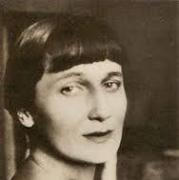
Akhmatova 1889 - 1966 (77)
You will hear thunder and remember me,
And think: she wanted storms. The rim
Of the sky will be the colour of hard crimson,
And your heart, as it was then, will be on fire.
QUOTES
In the awful days of the Yezhovschina I passed seventeen months in the outer waiting line of the prison visitors in Leningrad. Once, somebody ‘identified’ me there. Then a woman, standing behind me in the line, which, of course, never heard my name, waked up from the torpor, typical for us all there, and asked me, whispering into my ear (all spoke only in a whisper there):
“And can you describe this?”
And I answered:
“Yes, I can.”
Then the weak similarity of a smile glided over that, what had once been her face.
Between 1935 and 1940 she wrote the long poem Requiem, a lyrical masterpiece, dedicated to the victims of Josef Stalin's terror, and largely a maternal response to her son Lev's arrest and imprisonment in 1937. In 1949, her son Lev was arrested again and exiled to Siberia. In a desperate and futile effort to secure his release, Akhmatova wrote a number of poems in praise of Stalin. She later requested the exclusion of these poems from her collected work. After Stalin's death, Publication of her work, including her essays and translations, resumed. She received international recognition and died on March 5, 1966,